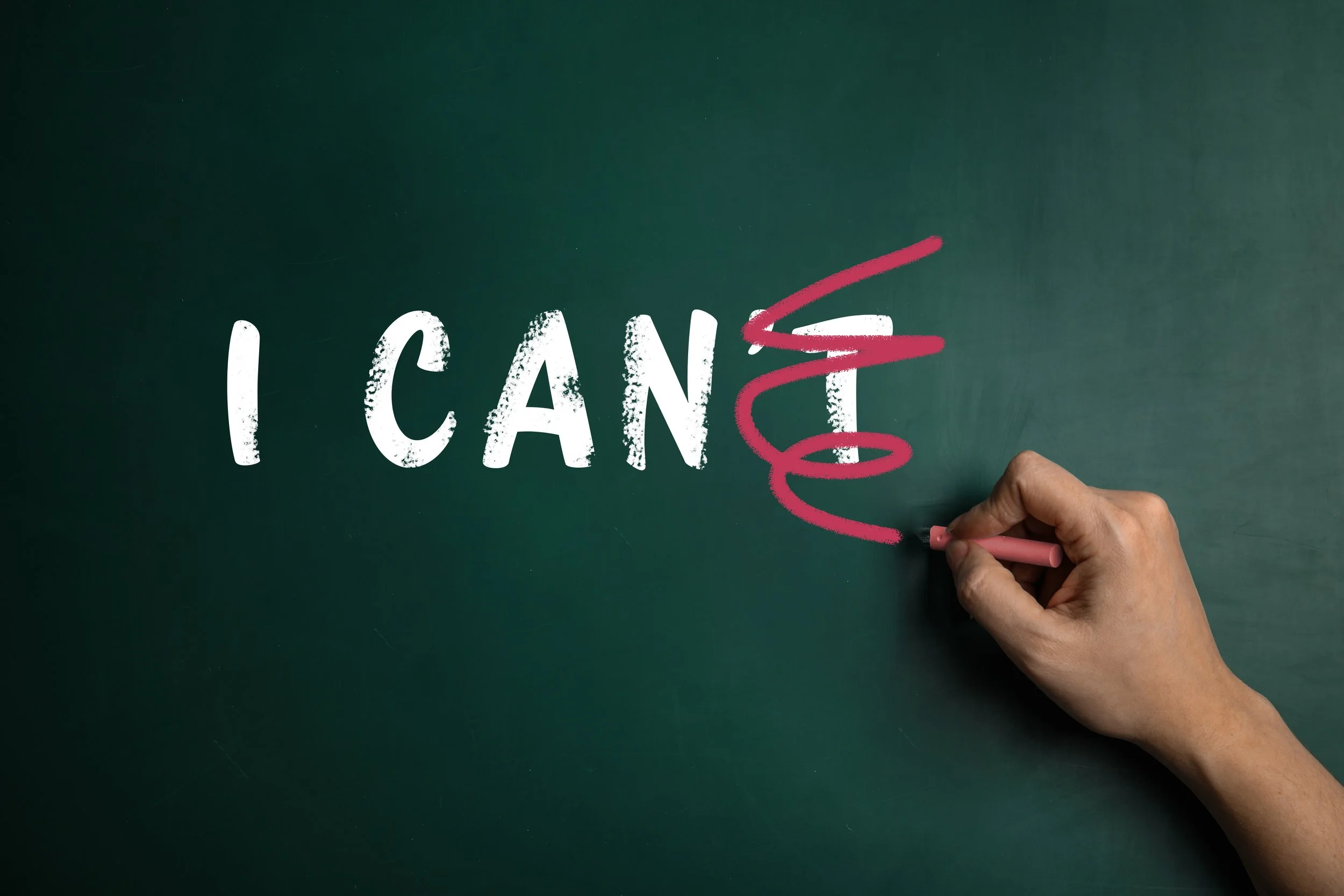Your Thoughts and You: Why Your Mindset Matters
When faced with a challenge, what thoughts come to mind for you? What do you believe about yourself? Are you confident you can address what comes your way? Do you sit back and think, “I can’t” or “I don’t know how?” Do you say, “This will be hard, and I can handle it?” Do you say, “I made a mistake, and I can learn from it?” Following your thoughts, what actions do you take, if any? Wondering why this matters?
How you approach a challenge, uncertainty, or defeat, including what you think and feel about it, makes up your mindset. Stanford University Psychology Professor Carol Dweck is credited with developing this concept as she explored her belief that personal traits or capabilities such as intelligence, personality, or character were unchangeable. As Dweck studied students and their ability to navigate difficult challenges, she noticed some individuals embraced the challenge and were even motivated by it. These students believed they were gaining knowledge because of the experience; this propelled them forward and enabled growth. Other students avoided the challenge, and some fell apart when confronted with the idea of failing. Their sense of ability and value was tied to their beliefs about their task performance.
According to Dweck, our mindset, or how we think about what we can or cannot do and what we are capable of, does not disappear as we grow older without active engagement. In fact, these beliefs impact our satisfaction, well-being, personal growth, and accomplishments. In addition, they influence how we make sense of life experiences, challenges, and mistakes. Having experienced this firsthand, I realize the limitations our mindset may hold for us. I was raised in a middle-class family in the Bronx, New York, until I moved to Fairfield County, Connecticut, after college. Years later, my husband and I settled there to raise a family. As a stay-at-home mom, I lost the sense of importance my job gave me, and I believed I needed to justify my worth as I compared myself to the many accomplished professionals around me. Despite my education, previous career, and global travel, I felt I was being judged and that my intelligence was unchangeable. As a result, I began to lose my sense of agency. This mindset kept me small for many years, and feeling like I was not good enough.
In Dweck’s book Mindset: The New Psychology of Success, Dweck states,
“The view you adopt for yourself profoundly affects the way you lead your life.”
She writes of two mindsets: 1) a fixed mindset and 2) a growth mindset. This article explores the two types of mindsets further and invites you to notice your beliefs, reflect on your tendencies, and choose if you want to learn more about your possible mindsets and how to work towards a shift.
Fixed Mindset
The concept of a fixed mindset involves believing that your traits and/or abilities are set and cannot change. With this mindset, you may fear being judged and focus on justifying your worth. You may choose to stay in your comfort zone and think that trying hard will not make a difference. As a result, your thoughts about your experience directly influence how you navigate the situation. It is common to avoid a challenge when you have a fixed mindset. For example, I’m hesitant to admit that I have a fixed mindset regarding math. It is true that when my children need help with math, I suggest their father assist them. Guess what I tell myself? If you thought something along the lines of “I can’t do math,” you’re right. Often, when people believe that they cannot change something, they do not try and, therefore, risk having failure define them in a lasting way leaving them stuck.
Growth Mindset
With a growth mindset, Dweck suggests you may choose to challenge yourself as you believe your abilities are like a foundation that you may build upon and change with effort, time, new strategies, and assistance. In this case, you find value in trying and think you will learn from the experience, even if you fail. Growth mindsets lead to greater resilience, personal development, and learning. For example, a close family member is moving forward after facing blood cancer for several years. Each day, he wakes up to exercise and meets the day with hope. When faced with a setback, he seeks expert knowledge and advice, reflects upon his needs, and, when ready, makes informed decisions. He believes he can improve, is open to possibilities, and is not defined by his setbacks.
Choices Pave Room for Growth
Our choices matter. As I navigated various challenges in my life, I began a journey of personal development and was able to identify, confront and question some of my deep-seated beliefs. This process of developing self-awareness, acceptance, and growth became a hobby for me. Eventually, I began working with a coach to help me shift my perspective and move forward. As a result of this effort and persistence, I reconnected with my passion to learn, am more resilient, and choose to take on new challenges to expand my mental and physical capabilities. I still have setbacks, yet I trust myself and believe I have potential. In addition, I often bounce back and/or find the good in challenging situations. I notice in times when I choose to connect with my growth mindset; I am grounded, confident, and willing to take calculated risks.
Recently, I had an experience where I took an advanced positive psychology coaching course taught by two world-renowned coaches for whom I have the utmost respect. The class was attended by intellectually curious and humble seasoned practitioners. During the course, we each took turns coaching one another in front of the group. At first, I hesitated to volunteer and even criticized my participation in class. When it was my turn to be the coachee, a new friend and talented coach helped me realize an old belief that was keeping me small and feeling like I was not enough. After I stopped to reflect on how this belief was impacting my life now, I realized my thoughts were following the old pattern of being fixed, believing I needed to prove myself to fit in and impacting the way I felt and showed up in class. This was liberating! I was passionate about learning and growing, which was tied to my value of service. If I wanted to serve my clients on a deeper level, I needed to show up as the person and coach I am now; otherwise, how could I grow and get better? As a result, I shifted my mindset by focusing my thoughts on the good things, such as the incredible opportunity to learn from and with these thought-provoking and talented individuals. It helped me remember that I chose this challenge because it was meaningful to me, and all the coaches were there to learn. Making this shift in my thoughts enabled me to practice self-care and engage in things like exercise and meditation so that I could calm and trust myself and my abilities, knowing that even if I made mistakes, it would be OK because I would learn. And when it was my turn to be the coach, I was good enough.
Consider Your Thoughts
So, what do you think? Recall a slightly challenging situation that occurred recently. What were your thoughts about it? Were you quick to see it as a mountain you cannot climb or a challenge you were ready to tackle? After a recent setback, what did you tell yourself? Do you believe you had a fixed or growth mindset in these situations? This introspective work may be uncomfortable for you, and that’s okay. What do you need to move forward, if anything?
With knowledge and practice, mindset can become a choice. One step toward building self-awareness around the type of mindset you have in a moment is to 1) stop, 2) notice, 3) recognize what you are thinking when facing a challenge or experiencing a setback, and 4) choose your thoughts wisely and what you want to believe moving forward. Consider asking yourself, "Is this belief/thought serving me right now?" Maybe think about how you show up and who you want to be in this situation. Wonder, what else might be possible?
Remember, your thoughts are the way you talk to yourself. What do you think? Your thoughts, beliefs, and how you make sense of your life matter. What will you choose to tell yourself next time you make a mistake or face adversity? Can you notice the next time you find yourself trying to prove yourself? Can you shift in these situations and be open to the possibility that there is something you can learn? If you want to find out more about your possible mindsets and how to work towards a shift, look for the next article, Transforming Your Mindset: Small Steps to Making a Change.
I am Andrea Garin Kopilak, founder of Connect2Flourish Coaching, and this is my life’s work. Today, I am committed to walking alongside you as you rewrite your story, reclaim your power, and craft a life that resonates with your truest self. Sound appealing? Let’s talk. Visit my website, www.connect2flourishcoaching.com or email me at andrea@c2fcoach.com.



